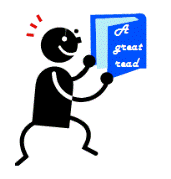I hope you find my writing and business tips and observations useful. My business and blog are dedicated to helping businesses communicate clearly and reach their potential.
Read, subscribe to my newsletter, enjoy!Tash
Get reading for winter!
It’s winter and many of us are in some form of lock down so what better time to catch up on some reading! 
I have just placed an order for some books with Book Depository and discovered they are running a read-a-thon. So in case it inspires you to read, or gives you some motivation to try some different books, I thought I’d share the idea here.
Get reading!
Basically, they are giving some ‘rules’ to guide your reading between 23 and 30 August:
- Read a book that was released in 2021
I think I might try Before she disappeared or Apples never fall - Read a book with an LGBTQIA+ character
For something different, how about Santa’s husband? - Read a prizewinning book
No Friend But the Mountains: Writing from Manus Prison by Behrouz Boochani is a good one to try, as is Taboo by Kim Scott - Read the first book in a series
I found Shatter by Michael Robotham an edge-of-your-seat thriller - Read a book inspired by women
The first to come to mind for me is I am Malala, followed by The Immortal Life of Henrietta Lacks - Read a book that has been featured on our blog
The book thief is one of these, and I enjoyed reading that - Read a book that will help you fulfill a resolution or a goal
If growing your business is a resolution or goal for you, you may like to read my Breadmaker review. Or maybe your goal is to gain and retain more customers.
Which rule will you chose for the read-a-thon for winter? I’d love to hear what books you read and what you think of those books, too.
Taking breaks makes you more productive, less overwhelmed
How often do you feel overwhelmed with things?
How often do you feel quiet – no tweets, emails or status updates firing at, no phone calls or client/boss requests, no attempts at reducing a to do list?
As I mentioned a few days ago, I heard a webinar in which Matthew May spoke about his book, The Laws of Subtraction (6 simple rules for winning in the age of excess everything).
I intend reading this book, and will review it in this blog, as I am very conscious of how much stuff business people have to deal with. We’ve always had to deal with multiple roles (accounts, marketing, sales, staffing, production, etc) but now we have digital presence and technical changes to keep up with as well.
I am also thinking of reading one of his other books, The Shibumi Strategy (A Powerful Way to Create Meaningful Change). It sounds interesting and apparently is written as a story rather than in typical business book mode.
Taking and making breaks
Matthew’s fifth law is ‘break is the important part of breakthrough’ and I think that will be a very interesting chapter. I think breakthroughs can change lives – whether it is a breakthrough new product that changes the world or a simpler breakthrough on a better way to deal with a difficult client or finding a new tool that will save you time.
Any break from routine/habit/patterns can make us look around, take notice and see the things we take for granted most of the time. Then we can be more creative and find solutions or new ideas.
I like the idea of regularly getting away from my desk – and by regularly I mean once an hour or so – but I admit I often get caught up in things and stay working for longer than I probably should.
So I want to ask how you fit breaks into your working day/week. Is it something you plan or do you ‘go with the flow’?
What do you do in your breaks?
Limiting information engages imgaination
Today I heard a webinar based on the book The Laws of Subtraction (6 simple rules for winning in the age of excess everything). Matthew E May, author of the book was interviewed by Suzi Dafnis of ABN.
His third law hits a similar theme to what I often write so I wanted to share it.
Law #3: Limiting information engages the imagination
This law is commonly stated as the cliché ‘less is more’ and writers are often told to ‘show not tell’ for more powerful writing.
Giving all the facts leads to overload and disinterests people so I suggest writing as little as possible to suit the message.
But I like Matthew’s twist – I believe it is true that too much information stifles imagination. Giving enough information to set a foundation is enough.
What information can you limit to get people’s imagination working in your favour?
Matthew gave the example of Steve Jobs launching the first iPhone – he showed one, explained some of what it could do and then said no more until it launched a few months later. And something like 20 million people signed up to buy one before it was on sale. That’s a lot of people acting on limited information, isn’t it?
* Image from Word Constructions
Book review: Freelance your heart out
Despite having a pile of business related books to read (or finish reading), and some more business recordings and webinars to hear, I have finished this eBook by Kris Emery.
Why have I read it faster than other books?
I think the fact it is shorter than many business books (being a 141 page eBook) makes it easier to get through it, but that’s not enough by itself. Freelance your heart out is a friendly, chatty style that is easy to move from page to page so it is achievable relatively quickly.
What is it about?
Kris works as a freelance transcriber and translator, and this eBook is basically her journey from corporate employee to successful freelancer. From her journey, Kris has picked up a few things and she shares them in this eBook so others can enjoy a freelance lifestyle if they wish.
While some parts are specific to transcribing and translating, most of the eBook is easily relatable for other freelance skills – as a freelance writer, I know I was either nodding along or finding a connection throughout her tips.
There are 25 specific tips in the book, each of which offers value to someone thinking of or starting as a freelancer. Read as part of the entire eBook, these tips are even more valuable as they come after a story or example that illustrates the tip.
Reading Freelance your heart out
As I’ve said before, hearing someone else’s business story is not my prefered way of learning something about business. However, Kris actually states the lessons, not just her story, so it becomes more useful than just her freelance story.
The writing style is easy to read, but does have some substance to it, and reading the eBook inspired some ideas and thoughts – and a few blog posts as well! A few spots I found hard to read, and needed to be reread more than once, which was a shame.
I like how Kris has included some practical information as well as more general tips (like learn to negotiate and set greater goals).
It is not, however, a complete guide to starting a freelance business, but gives some good ideas on what is needed and hope that it is possible for many people.
I also like the fact that she doesn’t make freelancing seem like easy street or something to do in your spare time to make a fortune – being a freelance anything takes time and dedication to make it work. It can br a great lifestyle (for example, I love being able to take my son to kinder and help at school as required) but it usually is much harder than having a traditional job.
Whether you end up working freelance or changing corporate jobs instead, having a realistic idea of freelancing could help you make a wiser decision about your future.
If you have ever tried freelance work, did you find it tough? Did you expect it to be easier than the reality turned out to be?
Breadwinner review
As 2012 is the national year of reading, I am going to share some of my reading this year through a series of book reviews. Here is the first one…
Breadwinner: a fresh approach to business success
by Tom O’Toole with Lowell Tarling
BAS Publishing, Seaford 2009
Some time ago, an IT trainer told me about a video by Tom O’Toole from the Beechworth Bakery. The trainer (and others at his training company) were using it in a business course to cover customer service. I then heard of Tom O’Toole in passing a few times.
Driving through Albury last year we happened across a Beechworth Bakery outlet and stopped for lunch. Whilst there, I bought a copy of Breadwinner by Tom O’Toole.
I admit I didn’t start reading it until January but was very impressed with it once I started. So much so we detoured to Beechworth on our way back from Canberra a few days later.
Personally, I generally don’t find biographies or autobiographies satisfying as a business book (as interesting as they may be to read for pleasure) but this book was a great blend of the two. Tom starts with a chapter on his philosophies from business and finishes with a chapter on his personal philosophies and lessons. In between was his autobiography from childhood to business success.
There are a number of thoughts in the book that I have come across before (if it’s to be, it’s up to me; it’s the little things that make a difference; goals are just dreams with a date) but they had an impact because they fit in Tom’s story – he shows how they helped him rather than lecturing readers with clichés.
Tom was a poor kid growing up on the banks of the Murray – and his childhood and family certainly gave him stories to entertain with in his book! Imagine kangaroos and frogs living in the house, brothers sharing a bed and living with your front door open and you’re heading towards young Tom’s world.
While Tom discusses his poverty and hardships, it is neither a pity party nor a ‘look how good I am for rising out of this stuff’. It is his story so he tells it, tells it honestly and lets us see how things influenced and taught him.
It’s a good read which will have you laughing and thinking.
From a business perspective, Tom does give ideas and examples of customer service and how to build yourself and your team for success.
In Tom’s words “this book is about making dough, the paper kind. It will hopefully get you out of your comfort zone, it certainly got me out of mine.” And me out of mine.
I recommend grabbing a copy and investing your time in it. Once you’ve read it, come back and let me know how it motivated you or changed your business.





Recent Comments